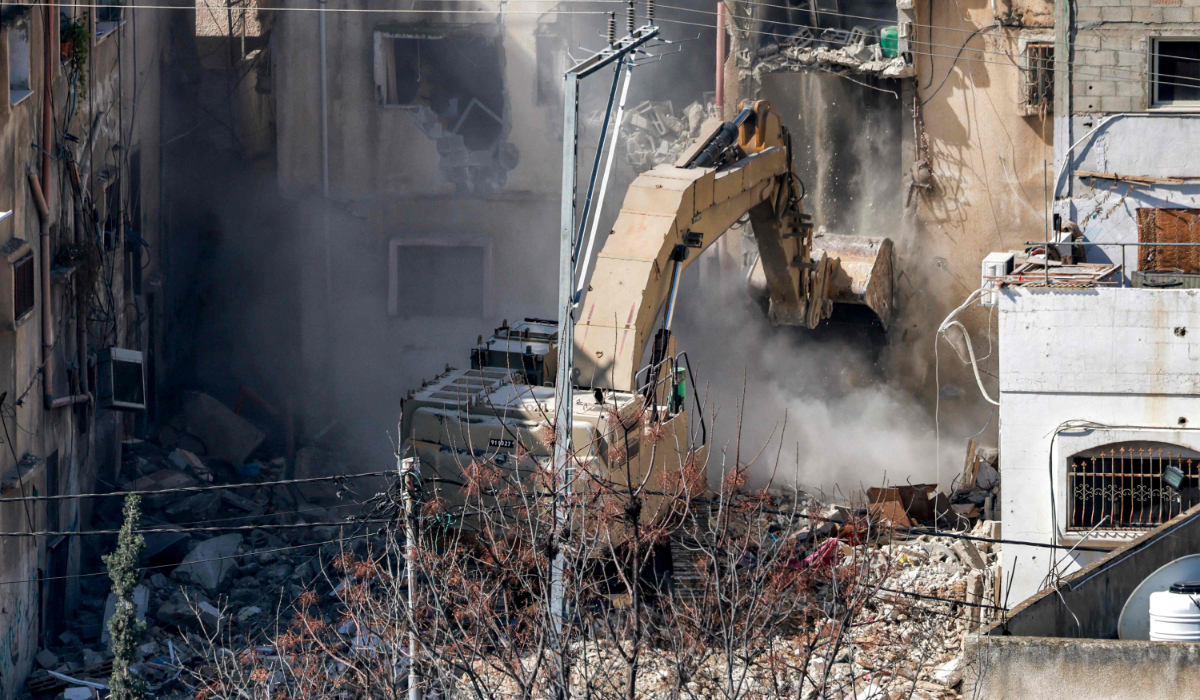GAZA STRIP, Palestinian Territories: Displaced by Israeli bombardment, the Tabatibi family gathered in central Gaza to eat together during the first Friday night of Ramadan, a scene that soon turned into a bloodbath.
An air strike hit the building where they were staying as women prepared the pre-fasting meal, killing 36 members of the family, survivors told AFP on Saturday.
The health ministry in Hamas-run Gaza, which provided the same death toll, blamed Israel for the strike in Nuseirat, while the Israeli military said it was looking into the incident.
“This is my mother, this is my father, this is my aunt, and these are my brothers,” 19-year-old Mohammed Al-Tabatibi, whose left hand was injured in the strike, said through tears at the Al-Aqsa Martyrs Hospital in nearby Deir Al-Balah.
“They bombed the house while we were in it. My mother and my aunt were preparing the suhoor food. They were all martyred.”
He spoke as bodies were spread out in the hospital courtyard, then stacked on a truck to be driven to a cemetery.
Because there were not enough body bags, some of the dead — including at least two children — were wrapped in white cloth stained with blood, AFPTV footage showed.
The first Friday of Ramadan, the Muslim fasting month which began on Monday, passed peacefully in Israeli-annexed east Jerusalem, despite concerns about tensions at the sacred Al-Aqsa Mosque compound.
But it was a different story in Gaza.
The strike in Nuseirat was one of 60 “deadly air strikes” reported overnight by the press office of the Hamas-run government, from Gaza City in the north to Rafah in the south.
“This is a bloody night, a very bloody night,” said Salama Maarouf of the Hamas-run government media office.
The war in Gaza erupted with Hamas’s unprecedented October 7 attack on southern Israel, which resulted in the deaths of about 1,160 people, mostly civilians, according to an AFP tally of Israeli figures.
Israel’s retaliatory military campaign to destroy Hamas has killed at least 31,553 people, mostly women and children, according to the Hamas-run territory’s health ministry.
In Rafah, where the majority of Gaza’s 2.4 million people have sought refuge, more bloodshed is feared after Israeli Prime Minister Benjamin Netanyahu’s office said on Friday he had approved plans for a military operation there.
Yet even before any such operation begins, air strikes continue, including one early Saturday that witnesses said killed Issa Duhair, the muezzin of a mosque, along with his two sons.
Mahmoud Duhair, a 41-year-old relative who lives nearby, described the muezzin as “a good man” who, as usual, dutifully performed the call to prayer before dawn on Saturday, then went to eat with his family “when his house was struck.”
Back in Nuseirat, in central Gaza, Yussef Tabatibi said the true toll of the strike that killed 36 members of his family could rise.
“Some of the martyrs we are unable to retrieve. We lack equipment, bulldozers, machinery, or anything else, ” he told AFP, his hands and sweatshirt covered with dust from trying to clear rubble.
“We retrieve them only with our hands. We brought shovels and hammers, but to no avail. Look at the extent of the destruction.”
‘Bloody’ Ramadan Friday as Gaza strike kills 36 relatives
https://arab.news/4nna5
‘Bloody’ Ramadan Friday as Gaza strike kills 36 relatives

- An air strike hit the building where they were staying as women prepared the pre-fasting meal, killing 36 members of the family
- The health ministry in Hamas-run Gaza, which provided the same death toll, blamed Israel for the strike in Nuseirat
































